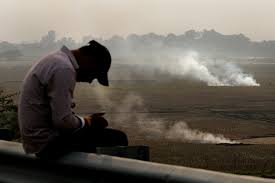
Record CO2 Rise: A Climate Crisis Unfolds
The recent surge in carbon dioxide (CO2) levels has raised alarm bells globally, particularly in the Indian context where the impacts of climate change are already being felt acutely. According to the World Meteorological Organization (WMO), CO2 concentrations reached a staggering 423.9 parts per million in 2024, marking a 3.5 ppm increase from the previous year. This spike is unprecedented since the beginning of atmospheric measurements in 1957, underscoring the urgent need for effective climate action.
India, being one of the largest emitters of greenhouse gases, faces significant challenges. The year 2024 was also the warmest on record, with global temperatures exceeding the critical threshold of 1.5 degrees Celsius above pre-industrial levels. This rise in temperature poses severe risks, including extreme weather events that India has been experiencing, such as floods, droughts, and heatwaves. The increase in CO2 levels points to the failure of international climate agreements, particularly the Paris Agreement, to effectively curb emissions.
The rapid increase in CO2 concentrations can be attributed not only to human activities but also to natural processes that are being disrupted by climate change. In India, the intense heat has reduced the ability of oceans and forests to absorb CO2. With forest fires becoming more common and droughts more severe, the natural sinks that typically help mitigate CO2 levels are becoming less effective. This creates a vicious cycle, exacerbating the climate crisis.
While CO2 is the most prevalent greenhouse gas, its effects are compounded by other gases like methane and nitrous oxide, which are also on the rise. The increase in these gases, although less dramatic than CO2, is still concerning. In India, agricultural practices contribute significantly to methane emissions, highlighting the need for sustainable farming techniques.
The WMO’s findings reveal a daunting challenge ahead. Despite efforts to reduce emissions, global levels continue to rise, and the emission reduction targets for 2030 are likely to be missed. In India, a concerted effort involving government policies, technological innovation, and community engagement is essential to combat this escalating crisis. The time for action is now, as the effects of climate change become increasingly evident, threatening both the environment and public health.











